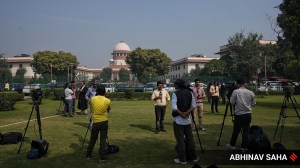- India
- International
Raj bhawan dharma
Apex court ruling on Arunachal serves a lesson to the BJP on institutional propriety, federal norms.
The restoration of the Nabam Tuki government in Arunachal Pradesh by the Supreme Court on Wednesday should serve as a warning to the BJP as it pursues its stated mission of a “Congress-mukt” Bharat. It has also raised troubling questions about the party’s tactics for the Northeast, just as it launched the North East Democratic Alliance (NEDA) in Guwahati. The SC has been punishing in its observations on Governor J.P. Rajkhowa’s conduct in Arunachal Pradesh. It found his “unilateral” decision to summon the assembly unconstitutional on various counts. Governor Rajkhowa ignored the constitutional principle of following the advice of the council of ministers and set off a series of events that resulted in the fall of the Tuki government. The beneficiary of his directives was the BJP, which stood accused of plotting with Congress rebels to take down the Tuki government. The sorry episode also set off rumours that the BJP leadership was exploring ways to destabilise other Congress governments in the region — in Manipur, Meghalaya and Mizoram. It could be said that the pattern had earlier been set in Uttarakhand, where the BJP had encouraged Congress rebels to switch sides to pull down the government and the Centre, ignoring parliamentary conventions, hastily recommended president’s rule in the state. In both cases, it was left to the judiciary — the Uttarakhand high court and Supreme Court — to remind the executive of institutional propriety and restraints, processes and procedures, while striking down President’s rule in the state.
WATCH VIDEO: Political Implications Of Supreme Court’s Arunachal Verdict
Since laying the Congress low in the 2014 general election, the BJP has been aggressive in its bid to bring in a BJP-dominant system. However, this expansion must be through democratic political means. In between electoral bouts, the BJP, as the party that rules the Centre, can ill afford to show disrespect for, or impatience with, institutions that hold up the framework of a constitutional democracy. Be it in Uttarakhand, Arunachal Pradesh or in Delhi, where it has a running battle with the AAP government, the BJP has been caught transgressing vital institutional lines and norms.
The template of using power at the Centre to destabilise opposition-led state governments, through manipulation of the office of governor, is a throwback to the 1970s and ‘80s, when Congress governments were notorious for misusing Article 356 and dismissing state governments with a popular mandate. The advent of coalition politics and rise in the influence of regional outfits changed the political idiom in the 1990s and the Bommai judgment of 1994 set down the parameters to test the legitimacy of a state government. Under the Modi government, which ironically talks about cooperative federalism, there has been a clear attempt to set the clock back. That the judiciary has stepped in with remedial action each time the political executive has crossed the line is reassuring, but it is also dispiriting that the court should have to do so.
EXPRESS OPINION
More Explained
Apr 26: Latest News
- 01
- 02
- 03
- 04
- 05


































